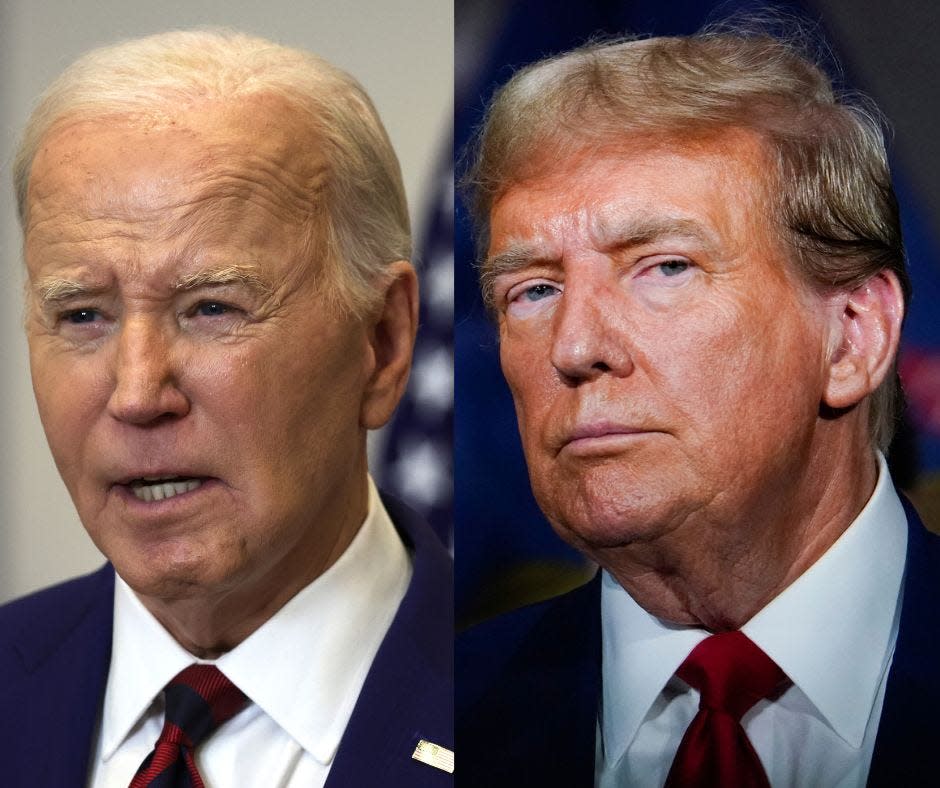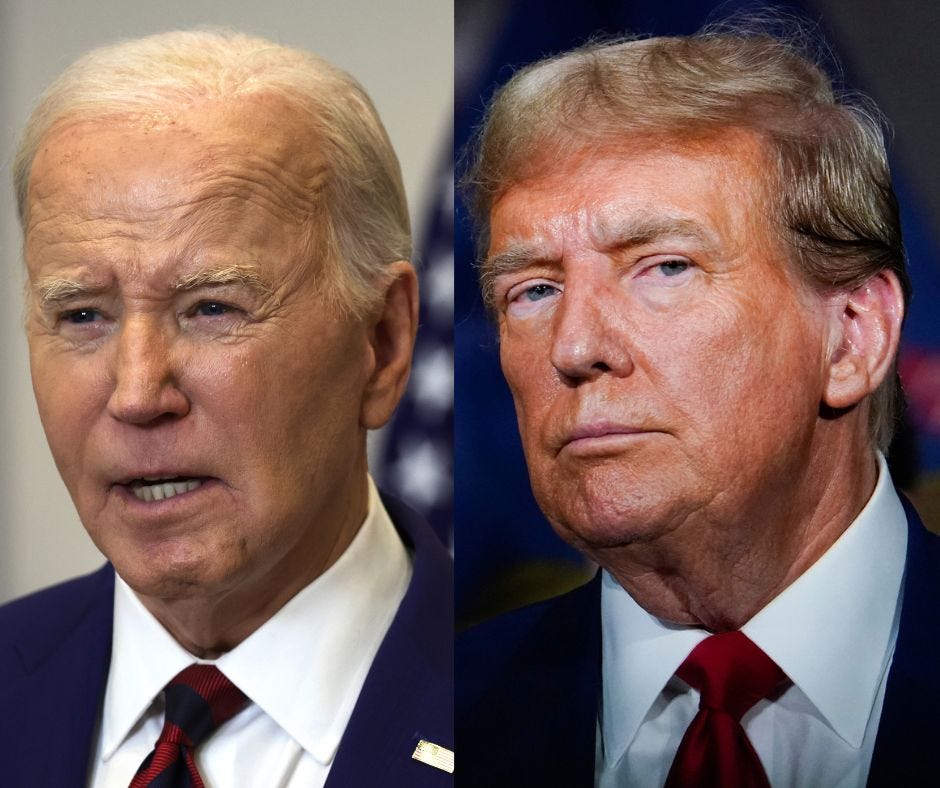WASHINGTON — Abortion is the leading political cause of our time, the most controversial and consequential since the fight for civil rights in the 1960s.
Half a century after the right to abortion was established by the Supreme Court – then rescinded in 2022 – the issue promises to be the dominant driver of this year’s presidential race.
No matter who wins, the legacy of the two leading candidates – both of them men – will be tied to a decision that primarily affects the lives of women.
Joe Biden, a devout Catholic, is personally opposed to abortion and once said the Supreme Court had gone too far in Roe v. Wade, the 1973 decision that guaranteed a woman’s right to an abortion. But throughout his five-decade career in public office, Biden has set his personal beliefs aside and supported the right to choose to end a pregnancy. Now the incumbent president, he is leading the charge to write reproductive freedom protections into federal law.
Donald Trump, the former president and presumptive GOP nominee, declared himself “pro-choice in every respect” in a television interview more than two decades ago. But when he first ran for president in 2016, he courted religious conservatives by proclaiming his opposition to abortion and even suggested women who get illegal abortions deserve “some sort of punishment.” Once in office, he stacked the Supreme Court with conservative justices who delivered the death blow to Roe v. Wade.Running again just four years after losing his reelection bid to Biden, Trump now boasts, “I was able to terminate Roe v. Wade.” Yet earlier this week, he angered anti-abortion activists by saying individual states should set their own restrictions on a woman’s right to choose and later announcing that he would not sign a national abortion ban if given a second term.
How the two candidates navigate the minefield of abortion politics over the next few months could determine which one of them returns to the White House.
“If Biden wins, it’s going to cement the importance of abortion rights as an issue to the electorate,” said Mary Ziegler, a law professor at the University of California, Davis and an expert on the law, history and politics of reproductive issues.
In Trump’s case, “abortion is already part of his legacy because of the overruling of Roe,” Ziegler said, “and I think he’s going to face, if he’s elected, really unprecedented questions about what this is going to mean.”
A rematch nobody wanted: Some big differences define Biden vs. Trump in 2024

‘More right than you are’
Biden entered public office just as the debate over abortion was about to upend U.S. politics for decades.
Only 30 at the time, Biden was sworn in as the new Democratic senator from Delaware on Jan. 3, 1973. Three weeks later, on Jan. 22, the Supreme Court handed down its ruling in Roe.
In his memoir “Promises To Keep,” Biden recalled heading to vote in the Senate for the first time and being asked by Sen. Abraham Ribicoff, D-Conn., where he stood on the issue. Biden told his new colleague that while he was personally opposed to abortion, he didn’t think he had the right to impose his view on others.
Ribicoff’s advice: “Pick a side. You’ll be much better off politically.”
Biden decided to stake out middle ground. He lamented to Washingtonian magazine in 1974 that the Supreme Court “went too far” with Roe and said he didn’t think a woman has “the sole right to say what should happen to her body.” That same year, however, he informed an angry group of anti-abortionist advocates that he would not back a constitutional amendment to ban the procedure.
“I am not sure my stand against such a constitutional amendment is right, nor am I sure the anti-abortionist stand is right,” he told the group, according to an account in the Wilmington Morning News. But, he said, “right now I think I am more right than you are.”
Biden’s position was not all that unusual at the time, said author Joshua Prager, who has written about the history of the abortion movement. Abortion had yet to turn into the potent political weapon it would become, and several other prominent Democrats of the era were either ambivalent about the issue or opposed abortion rights altogether.
“For a long time, abortion was completely apolitical. It was not in any way political or partisan,” said Prager, whose book “The Family Roe: An American Story” chronicled the life of Norma McCorvey, who as “Jane Doe” was the plaintiff in the lawsuit that led to the landmark Roe v. Wade ruling.
Throughout his Senate career, Biden resisted most efforts to restrict abortion access while objecting to federal funding of abortions.
In 1981, he authored what would become known as the Biden Amendment, which prohibited foreign aid from being used for biomedical research on abortion. He also consistently supported a separate measure known as the Hyde Amendment, which banned the use of federal funds for abortion except for cases of rape, incest or when pregnancy endangered the life of the expectant woman.
Biden would not change his position on Hyde until five years ago, when he was a candidate for president. Under pressure from his fellow Democrats, he announced on June 6, 2019, that he no longer supported the measure even though he had instructed his staff the day before to say that he did.
Biden suggested the reason for his about-face was that Hyde’s restrictions would interfere with his desire to provide a broad range of health services to women. But his shift was widely seen as an acknowledgement of the significance that Democratic voters had come to place on abortion rights.
Occasionally, Biden’s middle-of-the-road approach led to seemingly contradictory actions. In 1999, for example, he voted in favor of a Republican measure to ban a late-term procedure that critics have labeled “partial birth abortion.” That same day, however, he supported Democratic legislation endorsing Roe v. Wade as “an important constitutional right” that should not be overturned.
Throughout the early 2000s, before he left the Senate to become vice president, Biden voted to repeal a regulation that barred U.S. foreign aid from being used to perform or promote abortions. First put in place by Ronald Reagan, the so-called “Mexico City Policy,” also known among its opponents as a “global gag rule,” would become the equivalent of a political ping-pong ball. Whether or not it was in effect depended on whether the president was a Republican or Democrat.
Trump restored the policy early in his presidency. Biden rescinded it just a week after taking office.
Trump’s evasions and contradiction
Trump’s history on the abortion issue has been filled with evasions and contradictions, some of which are combining to create a massive election obstacle as he campaigns for another term as president.
The candidate who once described himself as “pro-choice” ultimately became the president who did more than anybody to undo abortion rights, appointing three conservative Supreme Court justices who would be part of the majority that overturned Roe v. Wade.
Now seeking to be the first president in more than 125 years to regain the White House after losing it, Trump is warning Republicans to be “careful” about how they deal with the issue because it has hurt them in elections.
In a new approach, revealed in a video he posted Monday, Trump is seeking to appeal to his anti-abortion base by saying he supports state efforts to ban or restrict the practice. He also has stressed the need for exceptions in cases of rape, incest and to protect the mother.
“The states will determine by vote or legislation or perhaps both,” Trump said. “Whatever they decide must be the law of the land. In this case, the law of the state.”
‘One person responsible’: Biden campaign blames Trump after Arizona abortion ruling
A long and winding road
For Trump, abortion has been a long and winding road filled with inconsistencies. He has often adjusted his positions on the issue.
Back in 1999, a time when he was thinking of running for president on the Reform Party ticket, Trump told NBC’s “Meet The Press” that “I’m very pro-choice. I hate the concept of abortion. I hate it. I hate everything it stands for. I cringe when I listen to people debating the subject. But you still – I just believe in choice.”
During Trump’s first presidential campaign in 2016, members of anti-abortion groups expressed worry about his commitment to their cause. The then-businessman and television celebrity sought to allay their worries by pledging to appoint conservative jurists to the Supreme Court.
Trump kept that promise. He appointed justices Neil Gorsuch, Brett Kavanaugh and Amy Coney Barrett to the high court, completing the majority that overturned Roe.
The post-Roe era
When Republican legislators rushed to ban abortion in their states after Roe’s demise, Trump became the one expressing concern. He blamed abortion for Republican losses in the 2022 congressional elections – a demonstration of the issue’s power to drive voters to the ballot box.
Noting the success of abortion rights candidates and referendums in conservatives states like Alabama and Kansas, Trump has warned Republicans to be careful about how they discuss the issue.
During a “Meet The Press” appearance this past September, Trump dodged when asked about a 15-week ban. “It could be state or it could be federal,” he said. “I don’t frankly care.”
Things got to the point where some of Trump’s opponents in the GOP primary, particularly Florida Gov. Ron DeSantis, accused the Republican presidential candidate of being soft on pro-life issues. Trump countered that DeSantis’ proposal to ban abortion after six weeks was a bad idea.
Trump also has called for compromise on abortion, though combatants on all sides say that is highly unlikely.
“I would sit down with both sides and I’d negotiate something,” Trump told ‘Meet The Press,’ “and we’ll end up with peace on that issue for the first time in 52 years.”
Skeptical abortion-rights supporters accused him of saying whatever would benefit him politically.
“We all know that Trump cannot be trusted and will say whatever it takes to get back into the White House,” said Jenny Lawson, executive director of Planned Parenthood Votes. “That includes lying about his support for a national abortion ban.”
Where is abortion banned or protected? A year after the fall of Roe v. Wade, abortion access is reshuffled on state lines
‘The power of women in America’
Biden and the Democrats, meanwhile, are seeking to cast Trump as the leader of the abortion ban movement.
Shortly after Trump announced that abortion restrictions should be left to the states, Biden’s reelection campaign responded with a digital ad featuring a woman who, choking back tears, said she suffered a miscarriage and nearly died twice from sepsis because doctors in Texas would not perform an abortion.
“Donald Trump did this,” the video concludes.
Trump’s state-federal distinction is meaningless, Democrats said, because he has supported a series of “extreme” state abortion bans. Biden and others said Trump is trying to make people forget his central role in overturning Roe.
“Donald Trump and all those responsible for overturning Roe don’t have a clue about the power of women in America,” Biden said. “But they are about to find out.”
Abortion has proved to be a winning issue for Democrats at the ballot box since the Supreme Court’s decision overturning Roe. Another ruling this week by the Arizona Supreme Court that upheld a 160-year-old abortion ban could further fire up voters in what is expected to be a key swing state in this year’s presidential race.
Biden’s reelection team is making the restoration of abortion rights a central theme of his campaign. Biden has taken multiple steps to protect reproductive freedom since Roe was overturned, such as issuing orders that protect access to medication, making legal representation available to women who choose to travel out of state for the procedure and expanding coverage for no-cost contraception.
In March, the White House took the unprecedented step of sending Vice President Kamala Harris to an abortion clinic in Minnesota to highlight the administration’s efforts to safeguard reproductive rights. Her visit was the first ever by a president or vice president to a clinic that provides abortion services.
Biden also continues to press Congress to write into federal law the abortion protections provided under Roe, the ruling that he once declared had gone too far.
With abortion once again a pivotal election issue, Biden’s campaign is eager to compare his record to Trump’s.
“For more than 50 years, Joe Biden has fought to protect Roe and women’s right to choose,” said Lauren Hitt, a spokeswoman for Biden’s re-election campaign. “Donald Trump on the other hand says he is proud to have overturned Roe and says women should be punished for getting an abortion. That’s the choice facing women this November.”
Asked about Trump’s complicated history with abortion, Trump campaign spokeswoman Karoline Leavitt insisted he “has long been consistent in supporting the rights of states to make decisions on abortion.” In 2018, however, Trump pushed for a federal ban on all abortions after 20 weeks. In 2023, speaking before a crowd of religious conservatives, he again endorsed the idea of national abortion restrictions but did not back any specific legislation.
Whether Biden or Trump wins in November, their history on abortion rights will help shape how they are remembered for years to come.
Reach Michael Collins on X, formerly Twitter, @mcollinsNEWS and David Jackson @djusatoday.
‘A moral battle with myself’: Young voters aren’t warming up to Biden. They know it means Trump could win again.
This article originally appeared on USA TODAY: Biden’s, Trump’s abortion stances could help one win reelection



